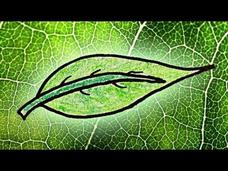Curated Video
These are the 4 main types of carbon-based molecules necessary for life
There are 4 main types of carbon-based molecules important to life. They are the building blocks for every living organism on this planet. In this video, I will give you a quick introduction to each type with some fun examples.
Curated Video
What are carbon-based molecules
Carbon-based molecules are the basis of life as we know it. Molecules like lipids, proteins, nucleic acids, and carbohydrates that make up all living things have one thing in common - carbon.
Crash Course
IR Spectroscopy and Mass Spectrometry - Crash Course Organic Chemistry
It’s time for molecular analysis! On this episode of Crash Course Organic Chemistry, we’re learning about mass spectrometry and infrared spectroscopy through the lens of a forensic investigation. Put on your lab coats, and let’s solve...
The Business Professor
Manufacturing Overhead - Predetermined Overhead Rate
Assigning overhead costs in accounting is difficult. This video explains the use of a predetermined overhead rate when assigning manufacturing overhead in managerial accounting
Curated Video
Solving Linear Equations with Rational Numbers: Fractions and Decimals
In this video, the teacher explains how to solve linear equations that involve both fractions and decimals. They demonstrate the process of converting fractions and mixed numbers to decimals, and then show different methods for solving...
Step Back History
What is the Voodoo Religion?
When I say the word Voodoo, what do you think of? You might think of eerie magic, witch-doctors, dolls of your enemies, or even zombies. I’m going to dispel the myths here and talk about not only this very misunderstood religion, but...
NASA
Searching for Signs of Life on Mars
ESA's (The European Space Agency) ExoMars rover is headed to the red planet in 2020, on a mission to search for signs of past or present life. One of its primary tools in this endeavor is MOMA, the Mars Organic Molecule Analyzer. MOMA is...
Curated Video
Most common types of hydrolysis - Study with me
In acid and base chemistry, we learn that there are 3 main types of hydrolysis: salt, acid and base. In this video, I will show you a fun and crafty way to spice up your organic chemistry notes on this topic.
SciShow
Do We Have To Give Up Bacon?
The IARC has categorized processed meat as a definite carcinogen. But how dangerous is it really? Do we finally have to give up bacon?
NASA
NASA | What is SAM?
Tucked inside the Curiosity rover is a miniature chemistry lab designed to unlock the secrets of Mars. Principal Investigator Paul Mahaffy, Deputy Principal Investigator Pamela Conrad, and MSL Participating Scientist Jennifer Eigenbrode...
Curated Video
Hydrolysis of carbohydrates
Hydrolysis is a water-based chemical reaction, where water is used to break down a specific substance or molecule. In this video, we will look at a specific type of hydrolysis - hydrolysis of carbohydrates. We will learn how water is...
Curated Video
Polysaccharides: the large carbohydrates you want to meet
Polysaccharides are large carbohydrates that have different structures and functions in humans and other living organisms. Starch, cellulose and glycogen are the 3 main types of polysaccharides we usually talk about when we learn about...
Curated Video
Fatty acids
Fatty acids are vital for energy, cell structure, and managing inflammation. Discover their types and functions in the human body. Whether it's saturated, unsaturated, or the crucial omega-3s, we break down how these molecules influence...
FuseSchool
How Are Strong & Weak Acids Different
Learn the basics about strong and weak acids, and how they differ. Strong acids are often used in School Science labs for experimentation but they have important uses in industry and the everyday world. Sulphuric acid for example is...
Curated Video
How Are Strong & Weak Acids Different | Acids, Bases & Alkali's | Chemistry | FuseSchool
Learn the basics about strong and weak acids, and how they differ. Strong acids are often used in School Science labs for experimentation but they have important uses in industry and the everyday world. Sulphuric acid for example is...
World Science Festival
What is Synthetic Biology?
What is life? What separates your molecules from ordinary matter? We all know that it takes DNA for an organism to live, grow, and reproduce, but what happens if we build entire DNA molecules in the lab? Is this also life? Watch this...
Stated Clearly
Can Science Explain the Origin of Life?
Support Stated Clearly on Patreon: https://www.patreon.com/statedclearly Darwin's theory of biological evolution helps us understand how simple life forms can give rise to complex lifeforms, but how did the first reproducing creatures...
Curated Video
What is a monosaccharide
Monosaccharides are the simplest forms of carbohydrates. Their classification, structure and examples are going to be discussed in this video.
Intelligence Squared
Obama's foreign policy is a gift to America's enemies
Highlights of the debate filmed on the 27th of May 2010.
Socratica
Properties of Water: Hydrogen Bonding in Water
Water is life! How is one small molecule responsible for so many big things? Socratica's series on biology presents a fascinating look at the universal solvent. From its adhesive properties caused by hydrogen bonding to its ability to...
MinuteEarth
Why Are Leaves Green? Part 1
Consider a question that baffles even scientists. Why are leaves green? The video lesson offers a theory that begins with the first aquatic plants. Learners consider alternative explanations as well.





